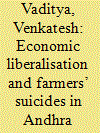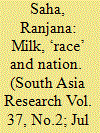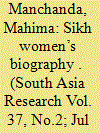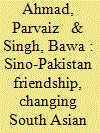|
|
|
Sort Order |
|
|
|
Items / Page
|
|
|
|
|
|
|
| Srl | Item |
| 1 |
ID:
153134


|
|
|
|
|
| Summary/Abstract |
The recent demonetisation in India is an issue of potentially wider relevance that requires further analysis. This brief article places the current evidence into a wider context, indicates how the process has been managed so far and then raises some searching questions concerning the role of the Indian state. Particularly, to what extent can this kind of measure be seen as evidence of responsible governance in the wider context of ‘Modinomics’, relating to claims that government should be less of a spender than an enabler? Wider elements of epistemology, asking how we know what we think we know about India’s black economy and informal sector are also gaining prominence in such endeavours.
|
|
|
|
|
|
|
|
|
|
|
|
|
|
|
|
| 2 |
ID:
153133


|
|
|
|
|
| Summary/Abstract |
Adversely affected by globalisation and state-based policy changes, India’s agricultural sector has recently experienced a marked increase in farmer suicides, most prominently in Andhra Pradesh (AP). This article examines the various policy changes leading to such agrarian distress and seeks to explore how the troubling phenomenon of farmers’ suicides may be curbed.
|
|
|
|
|
|
|
|
|
|
|
|
|
|
|
|
| 3 |
ID:
153132


|
|
|
|
|
| Summary/Abstract |
Migration from Nepal to India, a major issue in contemporary Nepal, has a wide range of consequences, including significant implications for the performance of masculinity. Remittances, and the associated pressures to send or bring money home, form a central part of the gendering of such migration, but many men are unable to remit to the levels expected of them. Consequently, this overshadows the cost/benefit analysis of migration for many families and brings into question the extent to which migration remains a viable income diversification strategy. The article, based on a multi-methods approach within an ethnographic framework, examines the potential range of effects that migration trajectories may have on males that migrate and are then finding themselves under pressure to remit and perform locally specific forms of masculinity.
|
|
|
|
|
|
|
|
|
|
|
|
|
|
|
|
| 4 |
ID:
153130


|
|
|
|
|
| Summary/Abstract |
This article analyses medical opinion about nursing of infants by memsahibs and dais as well as the Bengali-Hindu bhadramahila as the ‘immature’ child-mother and the ‘mature’, ‘goddess-like’ mother in the tropical environment of nineteenth and early twentieth century Bengal. It shows how the nature of lactation, breast milk and breastfeeding are socially constructed and become central to medical advice on motherhood and childcare aimed at regenerating community, ‘racial’ and/or national health, including manly vigour for imperial, colonial and nationalist purposes. In colonial Bengal, the topic of breastfeeding surfaces as crucial to understanding colonial and nationalist, medical and medico-legal representations of maternal and child health constituted by gendered, racialised, classed and caste-ridden, biological/cultural and pure/polluting traits, often considered transferable through milk and blood.
|
|
|
|
|
|
|
|
|
|
|
|
|
|
|
|
| 5 |
ID:
153131


|
|
|
|
|
| Summary/Abstract |
This article examines the biography of Bibi Harnam Kaur, the young co-founder of the Sikh Kanya Mahavidyalaya, established in 1892 in Ferozepur, Punjab as one of the earliest schools for the education of Sikh girls. The opening of this school by her husband, Bhai Takht Singh, raises questions about the extent to which such initiatives reflected the desire of Sikh men and of the Singh Sabha at that time to ensure that their women should become educated to emerge as ideal wives and mothers. The clearly hagiographical biography presents Bibi Harnam Kaur as an extraordinary young woman destined for greatness, but also raises many tensions, contradictions and conflicts hidden below the surface concerning female education in India, which a feminist reading of this biography against the grain seeks to bring out.
|
|
|
|
|
|
|
|
|
|
|
|
|
|
|
|
| 6 |
ID:
153129


|
|
|
|
|
| Summary/Abstract |
In the context of changing global geopolitics, South Asia as a global pivot amongst major regions and powers has recently acquired a more central geostrategic position. China and Pakistan have long been sharing strong political, cultural and economic relations and are portrayed as all-weather friends, amplifying their engagement to secure their respective specific interests within and outside the region. This Sino-Pakistan link has been treating India as a collective target, with China acting contrary to India’s interests also in light of rising Indo-US strategic leverage. Against this complex backdrop, which also implicates Central Asia, the ultimate focus of this article is to locate India’s geostrategic interests and future prospects in view of the strong Sino-Pak friendship. Our key findings suggest that in this new ‘Great Game’, Indo-US links are going to become even more crucial, but that India should not just wait for US decisions.
|
|
|
|
|
|
|
|
|
|
|
|
|
|
|
|
|
|
|
|
|